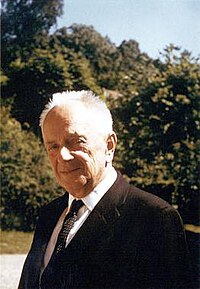
A recent anthology by philosophers of science challenging the "modern synthesis" in evolution draws an intelligent review from NDPR, here:
https://ndpr.nd.edu/news/challenging-the-modern-synthesis-adaptation-development-and-inheritanc/
What had to be brought together was some sort of Darwinian account of evolution on the one hand and Mendelian genetics on the other. The late 1930s and early 1940s were key, and the gelling of the synthesis involved a seminal book by Theodosius Dobzhansky in 1937, and another by Ernst Mayr in 1942 The term "modern synthesis" was attached to such work in the subtitle of a book by Julian Huxley, also in 1942.
I'll quote the review directly for some institutional history:
During this period significant institution building was taking place, coupled with theoretically significant gate-keeping. The Committee on Common Problems of Genetics, Paleontology, and Systematics, supported by a United States National Research Council, was launched in 1942 to establish a hitherto missing bridge between genetics and paleontology. It led to the formation of the Society for the Study of Evolution in 1946. The affiliated journal Evolution began appearing that same year. Mayr played key organizational roles in these developments that gave shape to the discipline of evolutionary biology.
I gather from the review that the various essays show the MS to be a pretty diffuse thing by now. It isn't especially meaningful to speak in Kuhnian terms of this as a "paradigm" for "normal science" and to ask about the candidates for the next revolution. But in general the synthesis is genocentric rather than phenocentric -- that is, it sees evolution as something that happens to and through gene lines rather than organisms. It generally still holds to the notion that variation is blind -- no gene ever undergoes a modification because that would be adaptive. Rather, it undergoes a blind modification and that is adopted by he environment as a successful modification. Further, the general presumption on issues of development is that one's DNA encodes the adult one in some sense 'ought to' grow up to be. If one doesn't mature into THAT phenotype, something has gone wrong.
The reviewer quotes one of the authors in the book saying happily that the modern synthesis has been "capacious enough to embrace a Dobzhansky, a Mayr, a Ford, a Dawkins, and even a Gould."
I've now mentioned Dobzhansky twice (three times including this sentence!)> I'll put an image of him at the top, then.
Comments
Post a Comment